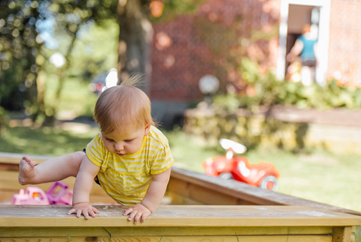8.6.6: Persistence
- Page ID
- 140105
Development of Persistence
As toddlers continue to grow, their developing abilities will lead them to taking on more challenging tasks such as climbing new obstacles and playing with toys in more complex ways, such as stacking blocks to create tall towers. But when these tasks become challenging, what determines when a toddler will give up or demonstrate persistence? Persistence in childhood has repeatedly been associated with positive outcomes. Persistence at 6 months predicts cognitive development at 14 months (Banerjee & TamisLeMonda, 2007), persistence at 3 years predicts language and math skills in kindergarten (Mokrova et al., 2013), and persistence in childhood predicts later academic achievement (Meier & Albrecht, 2003), success at career work, and healthy relationships, well into adulthood (Duckworth, Peterson, Matthews, & Kelly, 2007; EskreisWinkler, Duckworth, Shulman, & Beal, 2014). [1]

During challenging tasks, we consider the costs and rewards for continued persistence. Recent work has provided evidence that young children also consider costs and rewards when making decisions. For example, 18-month-olds weigh the expected costs and benefits of their actions when deciding whether to help an adult construct a tower composed of blocks of different weights (Sommerville et al., 2018). When toddlers were presented with a task researchers purposefully created to be impossible to do, increased failure led to decreased effort by toddlers (Radovanovic et al., 2021). Interestingly, toddlers who attempted various strategies during the impossible task persisted for longer in trying to do it. This research emphasizes the importance of developmentally-appropriate activities for infants and toddlers as well as the importance for caregivers to demonstrate different approaches to solve challenges. [1]
One factor that influences even very young children’s decisions about when to persist and when to give up is the behavior of the adults in their environment (Kamins & Dweck, 1999; Lucca, Horton & Sommerville, 2019). For example, toddlers tend to make generalizations about when to persist based on adult behavior. When 15-month-olds observed an adult work hard to achieve a particular goal (e.g. trying different strategies, repeating actions), they themselves attempted to activate a novel toy more times than toddlers who observed an adult succeed after little to no effort (Leonard, Lee & Schulz, 2017). Thus, our persistence with challenging tasks as caregivers, are demonstrations for infants and toddlers to learn about persistence themselves. [1]
[1] Rett & Walker (2020). Knowing when to quit: Children consider access to solutions when deciding whether to persist. Cognitive Science. CC by 4.0
[1] Photo by Alexander Dummer on Unsplash

